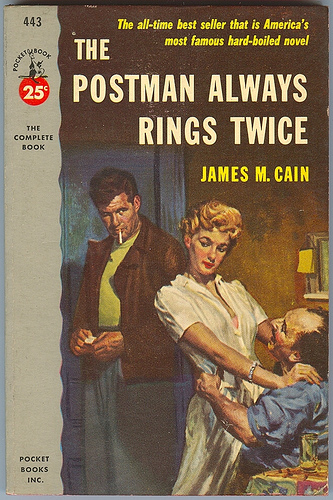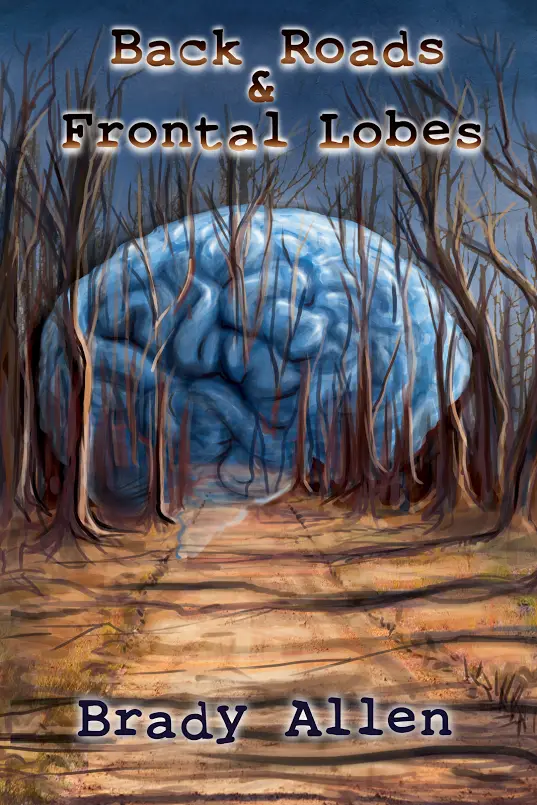
The Postman Always Rings Twice
James M. Cain
James M. Cain never spoke like his characters. In an interview with the Paris Review in 1977, he remembers Harold Ross describing what got him hired at the New Yorker. Ross said, “I began to realize as I listened to you talk, that none of your infinitives were split, all of your pronouns were correct, and that none of your participles dangled.” To which Cain adds, “That was true. I talked the way my father had beat into me; he was a shot for style, and that’s what got me a job.”
As it turns out, it’s a good thing the characters in Cain’s iconic roman noir, The Postman Always Rings Twice, don’t have the elevated speaking style of their author. Cain started out as a journalist, and emulating his colleague Sinclair Lewis (at the time a writer for the Saturday Evening Post until the publication of Main Street), wrote fiction on the side. Cain completed four novels before the success of Postman, which was published in 1934 to immediate success. Banned in Boston for its portrayal of violence and eroticism, the novella (just over one hundred pages) established Cain as a major novelist, and was acknowledged by Albert Camus as the model for The Stranger. In 1998, the book was included in the Modern Library’s list of top one hundred best novels.
Unlike crime stories of the time, Postman was among the first to portray events as the perpetrator saw them, much like Josef von Sternberg’s 1927 Underworld, one of the earliest films to portray the gangster’s point of view. Postman’s narrator is the drifter Frank Chambers, the protagonist-perpetrator of the crime. A hitchhiker dumped off a hay truck, he stumbles onto the roadside concession of Nick Papadakis and his bored, beautiful young wife, Cora. I’m embarrassed to admit I haven’t read a lot of noir or much of the mystery genre, and noticed right away the lack of descriptive language, save for the occasional simile of the kind that characterizes the noir style. Frank’s narration never shifts into the deeper level of thought and feeling you might expect in a first person narrator. For Cain’s characters, feelings exist off the page, and are instead suggested by quick detail, as in this exchange:
“Why did you marry him? You never did tell me that.”
“I haven’t told you anything.”
“We haven’t wasted any time on talk.”
Cain based the novel on a notorious murder trial, the Snyder-Gray case of 1927, in which a Queens housewife, Ruth Snyder and a corset salesman, Henry Judd Gray, murdered Ruth’s wealthy husband for his insurance policy. Cain was one of the journalists covering the trial, and he used specific events of the affair, the crime, the trial’s outcome—and made use of the material again in Double Indemnity. Of writing Postman, he said:
“The big influence in how I wrote The Postman Always Rings Twice was this strange guy, Vincent Lawrence, who had more effect on my writing than anyone else. He had a device which he thought was so important—the “love rack” he called it. . . . the poetic situation whereby the audience felt the love between the characters. He called this the “one, the two and the three.” Someone, I think it was Phil Goodman, the producer and another great influence, once reminded him that this one, two, and three was nothing more than Aristotle’s beginning, middle, and end. ‘Okay, Goody,’ Lawrence said, ‘who the hell was Aristotle, and who did he lick?’ I always thought that was the perfect Philistinism.”
Cain is the perfect filter for the lurid real-life events, giving them structure and style, or as then-President of Columbia Studios, Harry Cohn, called it, “algebra.” The voice of Frank Chambers is strangely reliable, his first person account is a confession after all, and has what might be clinically referred to as “lack of affect.” In reading Cain’s book, I discovered that what I thought I most enjoyed about fiction—that swimming in the consciousness of a character unlike myself— the lack of internal view couldn’t have mattered less. The stress on outward action and the absence of description are devices with a purpose. In leaving out description, Cain hasn’t sacrificed anything. It’s part of the brilliance of his approach, the hard protective case that gives the story its shape, and it’s the reward at the center of the mystery.
So is there any trace of Cain, that speaker of perfect sentences, in The Postman Always Rings Twice? As it turns out, there is. “It was my story, too,” he confessed to the Paris Review, “especially with the lingo in the mouth of a hobo with good grammar, like they have in California.”
—Lauren Alwan

